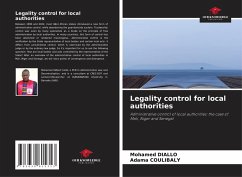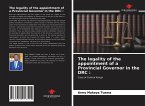Between 1990 and 2022, most West African states introduced a new form of administrative control, while abandoning the guardianship system. Trusteeship control was seen by many specialists as a brake on the principle of free administration by local authorities. In many countries, this form of control has been abolished or rendered meaningless. Administrative control is the verification by the State representative of local bodies and certain local acts. It differs from jurisdictional control, which is exercised by the administrative judge or by the ordinary law judge. So it's important for us to ask the following question: How are local bodies and acts controlled by the representative of the State? After an overview of the administrative control of local authorities in Mali, Niger and Senegal, we will raise points of convergence and divergence.
Bitte wählen Sie Ihr Anliegen aus.
Rechnungen
Retourenschein anfordern
Bestellstatus
Storno








